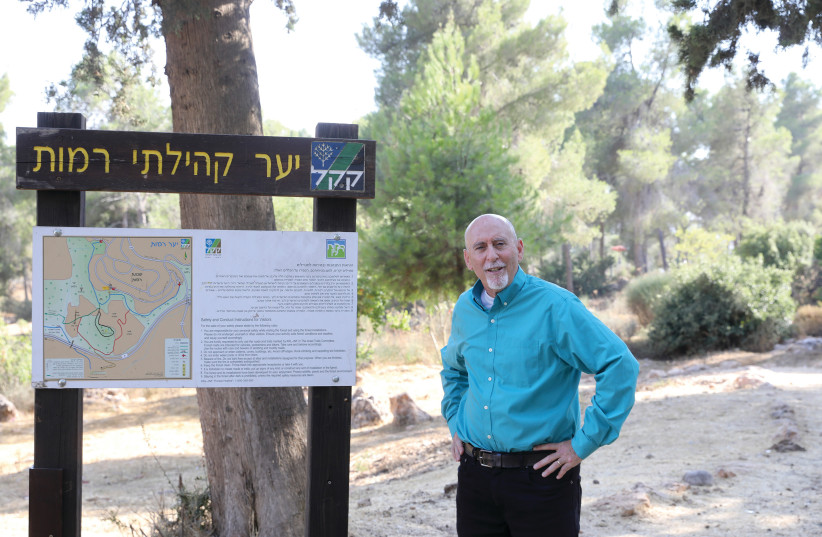The Norwegian Law was a success and should continue to be upheld in the next Knesset, MK Alon Tal said in an exclusive interview with The Jerusalem Post.
The law allows ministers and deputy ministers to resign their Knesset seats and for the next candidate, in whichever list they belong, to replace them.
Tal himself entered the Knesset because of the law. He is officially number 11 on the Blue and White list that only received eight seats in the 24th Knesset. However, three MKs above him on the list – Pnina Tamano-Shata, Chili Tropper and Orit Farkash-Hacohen – became ministers and resigned from the Knesset, leading to Tal’s opportunity.
The current coalition opposed the bill when it was introduced in the Netanyahu-Gantz government, but ended up using it broadly once it came into office in June last year.
Despite the opposition’s ridicule of the “Norwegian” MKs and its claims of hypocrisy, the law was a success for two reasons, Tal said.

First, “it allows the vast majority of ministers to be full time ministers and serve the public and not waste 20-25 hours in ridiculous filibusters and all the nonsense that takes place [in the Knesset],” he said.
“Second of all, it means that people come to the Knesset who are fully motivated. Who are the ‘Norwegians’ – almost across the board? We are people who have professional identities, have experience, have integrity.”
Most of the Norwegian MKs did not expect to make it to the Knesset, and when they did they hit the ground running, Tal said.
“We know that our time is limited, we’re passionate and we don’t have [political] aspirations – we [just] want to be parliamentarians. We were the ones in the oversight hearings, we were the ones writing the laws, we were the workhorses of this Knesset and had some great success,” Tal claimed.
"We know that our time is limited, we're passionate and...we want to be parliamentarians"
Blue and White MK Alon Tal on Norweigan Law MKs
MK Alon Tal in the 24th Knesset
TAL HIMSELF is an example of this. He is a leading Israeli environmental activist and academic, and founded, among other things, the Israel Union for Environmental Defense and the Arava Institute for Environmental Studies. He is also a graduate of Harvard University and served as the chairman of Tel Aviv University’s Public Policy department.
Tal led the new Knesset subcommittee on environmental and climate impacts on health, using it to raise awareness about environmental issues in Israel and to give a voice to local green organizations.
He also submitted a number of bills, such as a law that would require the Environmental Protection Ministry to publish a State of Nature Report every three years and an interim report every year and a half.
The bill passed its preliminary reading in October but did not make it to its first reading in the Knesset plenum.
A body called Hama’arag currently publishes such reports but is not required by law to do so. Hama’arag (literally “the weave”) is a joint initiative of the Environmental Protection Ministry, the Jewish National Fund (JNF), the Israel Nature and Parks Authority and Tel Aviv University’s Steinhardt Museum of Natural History.
Its latest State of Nature report published on Thursday shows that Israel’s open spaces were shrinking at a rate of approximately 30 sq. km. per year and that they were becoming disconnected from each other, especially in the north and center of the country.
THE REPORT also found that Israel was heating up at a faster rate than other Western countries, which has raised the frequency and danger of wildfires and has led to the extinction of numerous species in the Mediterranean Sea.
“The findings are worrying (as they are every year): Threats such as shrinking public space, harm to wildlife, pollution and more,” Tal wrote on Twitter about the report.
Tal mentioned the law he had tried to push through, writing: “I hope that we will be able to pass it under agreement during the Knesset recess. If not now, when?”
The bill’s slow progress was not a matter of chance, and reflected Tal’s disappointment with the conduct of the government ministers, who cast aside initiatives by MKs so as to focus on promoting their own achievements.
“The minute the budget passed, it’s as if, OK, now I can be self absorbed and forget about the Knesset if I’m a minister, and not worry about it,” Alon said.

Alon claims sabotage by environmental protection minister
The Blue and White MK said he suffered from “chronic neglect and almost sabotage from the environment minister,” Tamar Zandberg of Meretz.
“Instead of her embracing me and saying, ‘What do you really need, let’s get this done together because we are on the same side,’ I was fighting her the whole time to get basic laws passed.”
Despite the support of environment organizations, “all of a sudden my laws are no good,” Tal said. The disappointment with the ministers was a sentiment shared “across the board.”
This created disgruntled members of Knesset such as Yamina’s Idit Silman, who eventually quit the coalition. If Health Minister Nitzan Horowitz had cared to sit down with Silman, who was head of the Knesset Health Committee, her defection may have been avoided, Tal claimed. Silman herself may have just been looking for an excuse to defect, but for other MKs this was a real issue, he said.
LEGISLATION ASIDE, for Tal, one of the most important lessons of his past year was the importance of centrist parties.
In the end, this Knesset fell due to the “victory of tribalism,” he said. “We all know that [former president Reuven] Rivlin spoke about four tribes. In fact there are many more.
“This will be seen as a distinct turning point in Israel’s troubled relationship with the Arab minority: the fact that we had an Arab party that was part of the coalition and played the game,” Tal said.
“But when you join a coalition of this nature, everybody has to say, look, I have a lot of things I’m passionate about, but I have to move to the middle, I have to be moderate. I can’t get everything I want, and that is the price we have to pay for the greater good and to participate.”
But each party began pulling in its own direction to satisfy its base and was not able to put the good of the coalition first, Tal said.
“What we need to do in the next election is make sure the central parties run the show,” he said.
“People think that a centrist party is synonymous with an anaemic, parve, spineless, unprincipled thing. But the opposite [is true]. Centrist parties are every bit as passionate about what they believe in as everyone else. But unlike them they don’t buy into any kind of orthodoxy – we pick issues.”
Blue and White, for example, was the most active on issues of social justice and fought more than any other party for Israel’s poor and disempowered, the party’s MK claimed. It was also active about the environment and national security, issues that don’t necessarily go together.
“You look at each issue as it is and think what makes sense, and pick your position,” he said. “In a certain sense that is what we need in Israel, because we are way too locked in, where people get tunnel vision.”
“If you are a critical thinker, you have to be in the middle,” Tal said, which is why he felt that Blue and White was the right place for him.
“You can’t start off angry at the system.”
